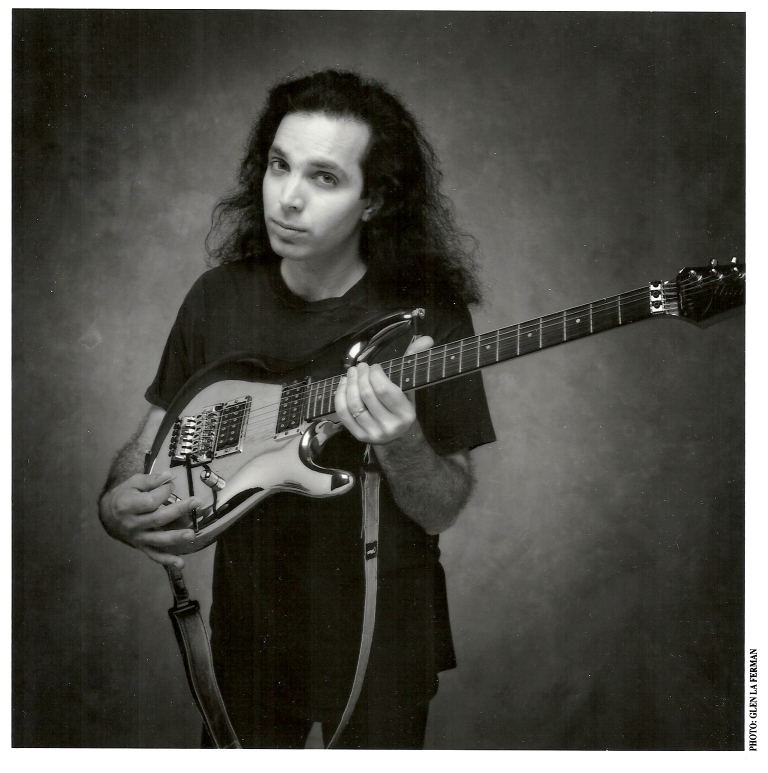Joe Satriani is one of the greatest guitarists around. He makes instruments sing with the bend of a string.
I interviewed him on Nov. 30, 1992, in advance of a Dec. 10 show in Pittsburgh.
Here is the story that appeared in The Indiana Gazette:
A label can be a great thing if you’re trying to sell a product, but don’t affix the title “guitar god” to Joe Satriani’s name — he won’t buy it.
“It’s the furthest thing from my mind. The only time I’m taken to task about it is during interviews,” explained Satriani, the guitar virtuoso from New York, during a recent phone conversation, as a preview to his Dec. 10 show at the A. J. Palumbo Center in Pittsburgh.
What Satriani does like to talk about is his music. It has taken five albums for radio to embrace what critics and fans have known all along, that Satriani writes beautiful songs — whether instrumental or with vocals.
His current release, an all-instrumental record, “The Extremist,” has been earning rave reviews and the cuts “Summer Song” and “Friends” have found a home on the radio, along with “The Crush of Love,” an instrumental Satriani released in 1988.
“When I first started, I thought it would be great to sell 10,000-15,000 records,” he explained.
“The instrumental genre wasn’t accepted because people didn’t understand it. My goals were completely artistic — if I could get someone to listen, I’ve accomplished something. I was completely surprised at the reception for this record. It’s doing amazingly well.”
Satriani’s last record, 1989’s “Flying In A Blue Dream,” featured his singing on several songs. It was the first time the guitarist tried his hand at vocals and the reactions were mixed from both the fans and critics.
Feeling at home “I wasn’t trying to be a vocalist, I just wanted to expand the music,” he said.
“The last record, ‘Flying In A Blue Dream,’ was my most popular record in Europe. When The Extremist’ was released, they were asking me why there were no vocals on this record. I got tons of letters from people telling me how important ‘I Believe’ was to them.
“Vocals didn’t really fit for the songs I wrote for this album. A record should be a very carefully, constructed thing. You have to pick what’s best and what fits.”
The process of choosing which songs to use took Satriani 18 months from start to finish.
When his previous tour ended in November 1990, he spent several months working off and on in the studio and also did guest spots on the last albums released by Alice Cooper and the fictional band Spinal Tap.
Satriani’s musical roots can be traced back to high school. His first foray into music as a teenager was as a drummer — until guitar legend Jimi Hendrix died on Sept. 18, 1970.
He explained he was really into the music of Hendrix, and he seriously became interested in the guitar to help fill a void he felt at Hendrix’s passing.
“The day he died is the day I decided to become a guitar player,” he said. “I never really had the benefit of a guitar teacher. There was a music theory teacher, Bill Westcott, in high school who taught me sight-reading and music writing among other things. After playing for several years, I took two months of lessons from the great b-bop piano player Lenny Tristano.
“I never attended Berkeley,” he said, in response to reports that he had been a student at the well-known music college.
“I was accepted, but a few months before classes started, I went to check the place out and was appalled at the lack of musicianship of the students and the living conditions.”
Instead, Satriani attended a smaller college for a month and a half before deciding he needed to be performing, not studying.
He recorded his first album in 1986 and paid for it on a credit card, since he had no backing from a record company. Joining the Greg Kihn Band was the next step in Satriani’s career.
“I played with them for almost a year, from October 1985 through September 1986, when they recorded their last record for EMI,” he explained.
“I didn’t join the first time they asked, but the second time. They had just lost a guitar player and I went to help them finish up guitar parts on the album and toured with them. It was a horrible situation for them — EMI dropped them after the album — but it was exciting for me because it helped me pay for my solo album that was financed on my credit card.”
Now, with the solid backing he receives from Relativity Records, Satriani can forget the finances and concentrate on what’s really important — his performance.
“Playing music, that’s what it’s all about,” he said. “Ninety-nine percent of all musicians are not rolling in money. If you love playing, it’s a good idea. There are plenty of good musicians who aren’t professional. But, it’s a very rough life and few people make a good living.”
Satriani is preparing to release his 15th album, “Shockwave Supernova,” on July 24.
The Shockwave World Tour begins November 1 in Manchester, England.
